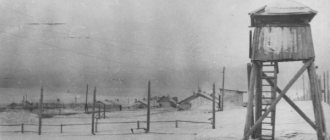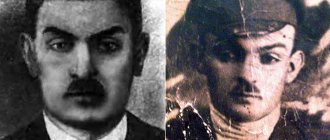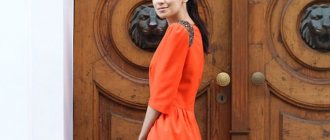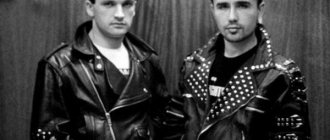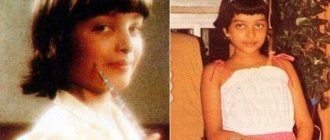The childhood years of the future writer
Krylov's biography begins as follows. The future writer was born in Moscow. Of course, readers would also be interested to know about the time of birth of such a person as Ivan Krylov. “When was he born?” - you ask. We answer: Ivan Andreevich was born in 1769, February 2 (13).
The future writer studied unsystematically and little. When Andrei Prokhorovich, his father, who served as a minor official in Tver, died, Ivan Andreevich was ten years old. Ivan’s parent “didn’t study science,” but he loved to read and instilled his love in his son. The boy's father himself taught him to write and read, and also left a chest of books as an inheritance to his son. See the portrait of Ivan Andreevich Krylov below.
Childhood and youth
The transition from the high genre of tragedy to the low genre of fable is explained not only by the writer’s literary attitudes, but also by the circumstances of his childhood and youth. Krylov was born into the family of an army officer who participated in the suppression of the uprising of Emelyan Pugachev, but did not receive any land or promotion from the authorities. Andrei Prokhorovich Krylov left only a chest of books as an inheritance to his son.
Based on indirect sources, we can conclude that A.P. Krylov actively participated in repelling the siege of Orenburg by the Pugachevites. A.S. Pushkin in his “History of Pugachev” testified that the entire Krylov family, including five-year-old Ivan, was sentenced by the rebel to hang.
They had to hide from Pugachev. At times there was nothing to eat. Perhaps because of this, Krylov will subsequently show an insatiable appetite. Among high society there were legends about the incredible gluttony of the fabulist.
Portrait of Ivan Krylov as a child.
Trying to improve the family’s financial situation, Krylov’s father went to civil service in Tver. There he received the position of chairman of the magistrate, but it did not bring significant income. In 1778, Andrei Prokhorovich died. Maria Alekseevna Krylova went with her children to the capital: firstly, she hoped to receive a pension for the loss of a breadwinner, and secondly, to take care of getting her eldest son a job.
The pension was denied, which forced the widow to earn a living by reading funeral prayers over the dead.
But with regard to Krylova’s second request, the government agreed. Ivan was hired as a clerk in the treasury chamber. Although they paid little, the threat of hunger and poverty receded into the background.
Life with Nikolai Alexandrovich Lvov
Krylov received further education under the patronage of Nikolai Alexandrovich Lvov, a writer who became acquainted with the poems of the young poet. In his childhood, the author we are interested in spent a lot of time in Lvov’s house, located in the same city where Ivan Andreevich Krylov was born (that is, in Moscow). He studied with this man’s children and also listened to the conversations of artists and writers who visited Nikolai Alexandrovich. Subsequently, the shortcomings of such fragmentary education affected. Krylov, for example, was always weak in spelling, but over the years acquired a fairly broad outlook and solid knowledge, learned to speak Italian and play the violin.
In Tver
In 1775, Ivan Krylov’s father retired and went with his family to his mother. Having no money, Krylov himself taught his son to read and write, and he read a lot and willingly. The boy walked a lot around the city, observing the life of the townspeople and attending debates at the seminary. There he first became acquainted with the performances that seminarians staged on stage. These sketches ridiculed bribery, red tape, and chicanery. Here for the first time Ivan saw with his own eyes what satire is. On the streets, he independently learned to speak a little Italian (there were many foreigners in Tver) and play the violin. And in the house of the landowner Lvov, he was allowed to study with teachers. And he began to study arithmetic, geometry and French. This is how the years of Krylov’s life passed. And my father was very ill, there was almost no money. In addition, another son was born - Levushka. Krylov the father did not rise and soon died, leaving the family almost in poverty.
Krylov's first plays
Among Ivan Andreevich’s hobbies, literary studies and visiting the theater came first. These addictions did not change even after he lost his mother at the age of 17 and was forced to take care of his younger brother. Krylov wrote a lot for the theater in the 80s. He created librettos for such comic operas as “The Mad Family” and “The Coffee House,” as well as tragedies “Philomela” and “Cleopatra,” and a comedy called “The Writer in the Hallway.” These works did not bring fame or money to the young author, but they helped him enter the circle of writers in St. Petersburg. Krylov was patronized by Ya. B. Knyazhnin, a famous playwright, but a proud young man, deciding that he was being mocked in the “master’s” house, broke up with his friend. He wrote a comedy called “The Pranksters” - a work in which the main characters, Tarator and Rhymer Stealer, strongly resembled the Prince and his wife. This was already a more mature creation than the previous plays, but the production of this comedy was prohibited. Ivan Andreevich's relationship with the theater management, which decided the fate of dramatic works, deteriorated.
Memoria. Ivan Krylov
On February 13 (2), 1769, fabulist Ivan Krylov was born.
Private bussiness
Ivan Andreevich Krylov (1769–1844) was born in 1769 in Moscow. During the Pugachev uprising, his father, an army officer, was an assistant commandant of the Yaitsk fortress. Shortly before Pugachev's Cossacks besieged the fortress, he managed to send his wife and little son to Orenburg. The boy was riding on a cart, hiding in a large clay pot. In Orenburg they had to endure a siege; Ivan Andreevich later recalled how cannonballs fell into their yard.
In 1775, Krylov’s father retired “due to poor health” and moved to Tver, where he entered the civil service. On March 17, 1778 he died. The mother, Marya Alekseevna, was left with two children in a rather dire situation. Only thanks to his acquaintance with the wealthy and enlightened Lvov family, Ivan Krylov was able to study science and French in their home. In 1778, Ivan Krylov, designated in the papers as “fifteen years old,” became a sub-office clerk in the Tver provincial magistrate, where his father had previously served. His duty was to copy out official papers.
According to a contemporary, in his free time, Ivan Krylov “attended with particular pleasure public gatherings, shopping areas, swings and fist fights, where he jostled between a motley crowd, listening greedily to the speeches of common people.” Service in the magistrate continued until 1782, when one of the children of the Lvov family was taken to St. Petersburg. Krylov also went with him. For some time he lives in the house of the famous architect Nikolai Lvov. In 1783, Krylov managed to get a job in the St. Petersburg treasury chamber.
But he no longer thought about a career as an official. Having met famous actors and playwrights of that time in Lvov’s house, he dreamed of a theater. Soon Ivan Krylov completes his first work - the comic opera “The Coffee House”. He composed tragic plays "Cleopatra" and "Philomela", which were not staged. Comedies worked out better; in 1786, Krylov composed the plays “The Mad Family” and “The Writer in the Hallway.” In December 1786, Krylov parted ways with the service of an official, finally deciding that his calling was in drama.
Krylov was introduced to the theater director, General Soimonov. He, having read his works, instructed him to translate the French play “The Infanta of Zamora” and ordered that the playwright be allowed into the theater for free. Then Soimonov took Krylov into his service. In 1787–1788, Krylov wrote another satirical play, “Pranksters.” Many influential writers recognized themselves in its heroes. In the person of the writer Rhymestealer, Krylov brought out Yakov Knyazhnin, in the person of Rhymestealer, Tarator, a writer and gossip, Knyazhnin’s wife Ekaterina Alexandrovna, the pedant Tyanislov was supposed to portray the poet Pyotr Karabanov, and the doctor Lantsetin was to portray the theater doctor and translator of operas I. Vienna, and so on. It was impossible to stage or even print the play, but it was widely distributed throughout St. Petersburg in handwritten copies. The writers, offended by the play, complained to their superiors.
Soon Soimonov forbade the staging of Krylov’s previously approved plays, and stopped allowing the playwright himself into the theater. Offended by this, Krylov distributed his letter to Soimonov to the public. The author of the letter allegedly did not believe in Soymonov’s behavior and tried to protect him from slander. The irony in the text sometimes bordered on outright mockery. The letter was written so skillfully that it quickly went around. However, the path to the stage for Krylov’s works was now closed. Krylov took up literary journalism. He published the magazines “Mail of Spirits”, “Spectator”, “St. Petersburg Mercury”. The publications were popular, but did not exist for long. At the end of 1793, Krylov was ordered to leave St. Petersburg. Little is known about his life in the next three years.
At the beginning of 1797, Krylov became close friends with Prince Sergei Golitsyn. The prince invited Krylov to take the place of his personal secretary and home teacher. Krylov ended up on the prince’s estate in the Kyiv province, where at that time the prince himself lived by order of Emperor Paul. Krylov taught the prince's sons languages and literature. Especially for the Golitsyns’ home theater, Krylov wrote the buffoonish tragedy “Podchipa” and in it he himself played the role of Trump, an arrogant German prince. The play was a sharp satire aimed at the order established under the reign of Paul. Censorship did not allow it on stage for 20 years, but the “buffoonery” was sold throughout the country in hundreds of copies and was staged in home theaters.
On March 11, 1801, Alexander I ascended the throne, in whom Prince Golitsyn enjoyed great confidence, as a result of which he was appointed governor-general of Livonia, and Krylov began to manage his office. Krylov served in Riga for two years, and in the fall of 1803 he moved to Serpukhov to live with his brother Lev Andreevich, an officer of the Oryol Musketeer Regiment. At the same time, Krylov’s play “Pie” was staged in St. Petersburg, which was a success. Encouraged by this, Krylov returned to literary activity. Finally, in 1806, Krylov returned to St. Petersburg and settled there forever. Within one year, two of his comedies - “Fashion Shop” and “Lesson for Daughters” - staged on stage, again made Krylov a literary celebrity. In 1808, Krylov was again assigned to serve, this time in the Coinage Department, but on September 30, 1810 he resigned, having since then been engaged in literary work. His fables are becoming increasingly popular.
In 1811, Krylov was elected to the Russian Academy. On January 7, 1812, his service began in the Imperial Public Library, first as an assistant librarian, then as a librarian, which lasted 12 years almost until his death. At the same time, he was assigned a pension of 1,500 rubles a year, which was subsequently (March 28, 1820), “in honor of excellent talents in Russian literature,” doubled, and even later (February 26, 1834) quadrupled. With the founding of the literary society “Conversation of Lovers of the Russian Word” in 1811, Krylov became its member and at the very first meeting read the fable “The Gardener and the Philosopher.” Various scholars and literary societies choose him as a member. In 1841, when the Russian Academy was transformed into the department of Russian language and literature of the Academy of Sciences, Krylov became an ordinary academician in the department of literature. Krylov died on November 9 (21), 1844 in St. Petersburg. The students carried the coffin with his body in their arms to the Alexander Nevsky Lavra.
What is he famous for?
Ivan Krylov
In 1805, Krylov met the famous fabulist Ivan Dmitriev in Moscow and showed his translation of several of La Fontaine's fables. Dmitriev liked the fables and, thanks to his recommendations, were published in the Moscow Spectator magazine. They say that Dmitriev then told Krylov: “This is your true family; at last you have found it.” In 1809, the first edition of “Ivan Krylov’s Fables” was published; the book included twenty-three fables. In 1811, “New Fables of Ivan Krylov” appeared, in 1815 - “Fables of Ivan Krylov” in three parts, in 1816 - “New Fables of I. A. Krylov”, which made up the fourth and fifth parts, in 1819 an edition was published in six parts, and in 1830 already in eight. The first fables were translations from La Fontaine, but already in 1807 Krylov also composed fables based on his own stories. The first of them was the fable “Larchik”. Later, while reading Aesop's fables, Krylov translated into poetry a number of Aesopian plots that were absent from La Fontaine. Soon after the first edition of his fables, Krylov became famous. But his cycle of fables dedicated to the War of 1812 brought him particular fame: “Partition”, “Wagon Train”, “Crow and Hen”, “Wolf in the Kennel”, “Pike and Cat”. Moscow militiaman S. N. Glinka o. The popularity of Krylov’s fables in the active army was confirmed by K. N. Batyushkov in a letter to N. I. Gnedich: “Tell Krylov that he is ashamed to be lazy: and in the army everyone recites his fables by heart. I often heard them at bivouacs with new pleasure.” The fables reflected events: disagreements among the command at the first stage of the war (“Partition”), the capture of Moscow by the French and famine in the French army (“The Crow and the Hen”), Napoleon’s proposal for peace negotiations (“The Wolf in the Kennel”), the slowness of Admiral Chichagov, who missed Napoleon near the Berezina (“Wagon Train”, “Pike and Cat”), Congress of Vienna (“Dog Friendship”).
What you need to know
Krylov’s activities in literary journalism deserve interest. After a conflict with Soimonov, which meant the end of his career in the theater, Krylov began working in Ivan Rachmaninov’s weekly magazine “Morning Hours,” publishing fables and satirical essays there. In 1789, Rachmaninov agreed with Krylov that he would begin to publish a more serious magazine, “Mail of Spirits.” In this magazine, all materials were “letters” from air, water and underground spirits. According to contemporaries, Spirit Mail was the most daring satirical magazine of that time. Among the characters in the fairy-tale correspondence, the reader recognized famous writers, theater figures, high officials, and sometimes the empress herself. The authors of the letters were not indicated; they were believed to belong to eight spirits: Zor, Buriston, Astaroth, Vestodav, Boreid, Dalnovid, Svetovid and Vysprepar, as well as the philosopher Empedocles and the wizard Malikulmulk. The author of most of the letters was Krylov. The magazine began publication at the end of January 1789 and lasted only eight months. It is still not entirely clear what caused its closure: financial unprofitability or increased government supervision caused by the news of the storming of the Bastille. Krylov decided to open his own printing house so as not to depend on other publishers. Together with the actors Dmitrievsky and Plavilshchikov, as well as the young writer Alexander Klushin, he founded a book publishing company. In 1792, he began publishing the magazine “Spectator” (11 issues were published). From the beginning of 1793, the “Spectator” turned into the “St. Petersburg Mercury”. But the magazine was published only for a year, since after the execution of Louis XVI, the Russian Empress was suspicious of all journalists. The St. Petersburg Mercury was not officially closed, but the last issues were published in the printing house of the Academy of Sciences under the supervision of a state editor. Afterwards the publishers were asked to leave the capital. Prazha, this was done in a rather mild form, for example, Klushin was given money and allowed to go to Germany to continue his education. The December issue of the magazine ended with a statement from Krylov and Klushin: “The Year of Mercury is over - and it will not continue due to the absence of the publishers.”
Direct speech
In the bookstores near the Kuznetsky Bridge from the bookseller Zandmark and on Pokrovka from the bookseller Miller, subscriptions are accepted for a monthly publication published again since January 1789 under the title: “Mail of the Spirits, or the learned, moral and critical correspondence of the Arab philosopher Malikulmulk with the water, air and underground spirits." His publisher notifies in his advertisement that he serves as the secretary of this Arab wizard who recently arrived here, who has a great aversion to crazy houses and has settled down to live here incognito for some time, which is why he intends to publish the correspondence of this noble gentleman of his kind...
I. A. Krylov Notice of the publication of “Spirit Mail”
There was a time when they couldn’t decide who was superior – Chemnitzer or Krylov, and there was a time when Dmitriev, as a fabulist, was considered superior to Krylov. This time has long passed, and now, knowing how to appreciate Khemnitser and Dmitriev, everyone knows that Krylov is immeasurably higher than both of them. His fables are Russian fables, not translations, not imitations. This does not mean that he never translated, for example, from La Fontaine, and did not imitate him: it only means that in both translations and imitations he could not and did not know how not to be original and Russian to the highest degree. Such is his Russian nature! Look if the nickname “grandfather”, with which Prince Vyazemsky so cleverly dubbed him in his poem, does not become the popular name of Krylov throughout Rus'!
V. G. Belinsky
13 facts about Ivan Krylov
- When his father died, Ivan Krylov was nine years old, and his younger brother Lev was two years old. Krylov took care of his younger brother all his life, who in his letters called him “daddy.”
- Ivan Krylov’s first play, “The Coffee Shop,” was about the disappearance of spoons in a landowner’s house. The spoons were found using fortune telling on coffee grounds, the fortune teller conspired with the kidnapper-clerk, and pointed to the young guy Peter, from whom the clerk wanted to take the bride away. However, everything came to a happy ending, the deception was exposed, and Peter married his beloved Anyuta.
- The publisher Breitkopf offered Krylov the first fee in his life for the play “The Coffee House” - sixty rubles. But the author chose to receive his fee not in money, but in books by French playwrights: Racine, Moliere and Boileau.
- One of Krylov’s pseudonyms was “Navi Volyrk” - “Ivan Krylov”, read backwards.
- There is evidence that after being expelled from St. Petersburg in 1793, Krylov made a living by playing cards. He was a very skillful player and once won a very large sum for those times - thirty thousand rubles.
- Living for some time on Tatishchev’s estate, Krylov decided to “experience the life of the first man,” that is, a savage. “He grew a beard, grew long nails and hair - and now he walks around the garden with a book. This went on for several months." The experiment continued until the owner of the estate returned. “Once, deep in reading, he hears the nearby sound of a carriage, looks around - and what? The Count and his entire family are before his eyes. At this wonderful, amazing meeting, noise and shouting arose in the carriage, and our Ivan Andreevich disappeared at that very moment.”
- After the formation of the State Council in 1810, the first chairmen of departments in it were Pyotr Zavadovsky, Nikolai Mordvinov, Pyotr Lopukhin and Alexey Arakcheev. The first few meetings were devoted to deciding how to seat them. Krylov responded to this with the now famous fable “Quartet”.
- The fable “The Cuckoo and the Rooster” contained an allusion to the writers Nikolai Grech and Thaddeus Bulgarin.
- Under the influence of his colleague at the Public Library, Nikolai Gnedich, Krylov learned ancient Greek at the age of fifty.
- Ivan Krylov was distinguished by good health. He started swimming regularly in April and ended in November, when he had to break the ice to swim.
- The nickname “Grandfather Krylov” appeared in “Song on the Day of I. A. Krylov’s Jubilee” by Pyotr Vyazemsky (1838), where the refrain was repeated: “Hello, Grandfather Krylov.”
- When asked why he doesn’t write new fables, Krylov answered: “Because I prefer to be reproached for why I don’t write, than to finish writing so that they ask why I write.”
- On May 12, 1855, a monument to Krylov by Pyotr Klodt was unveiled, becoming the first monument to a writer in Russia.
Materials about Ivan Krylov
Article about Ivan Krylov in Russian Wikipedia
Works of Krylov in the Moshkov Library
I. A. Krylov in the memoirs of his contemporaries
Activities of Ivan Andreevich in the field of journalism
Since the late 80s, this author’s main activity has been in the field of journalism. For 8 months in 1789, Ivan Andreevich published a magazine called “Mail of Spirits”. The satirical orientation, which appeared already in early work, was preserved here, but was somewhat transformed. Krylov painted a caricature depicting modern society. He framed his story in the form of correspondence between the wizard Malikulmulk and the dwarves. This publication was closed because the magazine had very few subscribers - only 80. Judging by the fact that Spirit Mail was republished in 1802, its appearance did not go unnoticed by the reading public.
Similar to the surname "Krylov":
- Kryladze
- Krylanova
- Krylas
- Krylasov
- Winged
- Krylatkina
- Krylatkov
- Krylatkova
- Krylatov
- Krylatovashugaevao
- Krylatskaya
- Krylatsky
- Winged
- Wingman
- Krylev
- Krylevskaya
- Krylevskayagardens
- Krylevskayachervyakova
- Krylevsky
- Krylenkin
- Krylenko
- Krylepova
- Kryletsky
Magazine "Spectator"
In 1790, Krylov’s biography was marked by the fact that Ivan Andreevich retired, deciding to focus on literary activity. The writer acquired a printing house in January 1792 and, together with Klushin, his friend, also a writer, began publishing a magazine called “The Spectator,” which was already enjoying some popularity.
The “Spectator” received the greatest success from the works written by Krylov himself: “Kaib”, “Thoughts of a Philosopher on Fashion”, “Speech Spoken by a Rake in a Meeting of Fools”, “Equivalence in Memory of My Grandfather”. The number of subscribers grew.
"Mercury"
The magazine was renamed Mercury in 1793. His publishers by that time focused on ironic attacks against Karamzin and his supporters. The reformist work of this writer was alien to “Mercury”; it seemed overly subject to Western influences and artificial. One of the favorite themes of Krylov’s work in his youth, as well as the object of depiction in many comedies written by him, is admiration for the West. Karamzinists, in addition, repelled Ivan Andreevich with their disdain for the classicist tradition of versification; this writer was outraged by Karamzin’s “common people,” overly uncomplicated style.
The publication of Mercury ceased in 1793, and Krylov left St. Petersburg for several years.
The life and work of the writer in the period from 1795 to 1801
For the period 1795-1801. Only fragmentary information about his life has survived. Krylov's biography of that time is presented very briefly. It is known that he traveled around the province, visiting the estates of his comrades. In 1797, the writer went to S.F. Golitsyn and lived with him as a children's teacher and secretary.
The play entitled “Trumph, or Podschipa” was written in 1799-1800 for Golitsyn’s home performance. Tsar Paul I could be seen in the evil, arrogant, stupid warrior Trumf. The irony was so caustic that this play was first published in Russia only in 1871.
First fables
After the death of this tsar, Prince Golitsyn was appointed governor-general in Riga, and Ivan Andreevich Krylov was here for 2 years as his secretary. He retired again in 1803 and traveled around the country playing cards. It was at this time, about which little is known, that Ivan Andreevich Krylov began to create fables.
In 1805, the writer showed in Moscow to I. I. Dmitriev, a famous fabulist and poet, his translation of two of La Fontaine’s fables - “The Picky Bride” and “The Oak and the Cane.” Dmitriev highly appreciated the work done by Krylov and was the first to note that the author had finally found his calling. Ivan Andreevich, however, did not immediately understand this himself. In 1806, he published only 3 fables, and then returned again to drama.
Biography of I. A. Krylov
Ivan Andreevich Krylov was born on February 2, 1769 in Moscow in the family of a modest army officer. His father, Andrei Prokhorovich Krylov, served for a long time as an ordinary soldier, then as a company clerk, and eventually rose to the rank of sergeant. He distinguished himself during the suppression of the Pugachev uprising and retired in 1774 with the rank of captain.
After his resignation, he was appointed to the post of chairman of the Tver provincial magistrate. So little Krylov ended up in Tver. He was raised by his mother. She was, according to the fabulist himself, a simple woman without education, but naturally intelligent. At the age of 10, the boy’s father died, and the family was left without any means of subsistence.
The boy's mother, having become a widow, sought a pension, addressed a petition to the highest name, and begged him to condescend to her poverty and take into account her husband's long and blameless service. But the pension was denied, and Krylov’s mother began to earn money for her daily bread by performing services in rich houses and reading the psalter for the dead.
The youngest Krylov was assigned as a sub-clerk to the same provincial magistrate where his father served during his lifetime. But in the winter of 1782, mother and son moved to St. Petersburg. There Krylov was taken to the office of the St. Petersburg Treasury Chamber. The family owed this to the merits of their deceased father. Although the widow was denied a pension, the state showed participation, and the son of the honored captain was given a more or less decent job.
Three famous plays in 1807
The writer released three plays in 1807, which became very popular and were successfully staged. These are “Ilya Bogatyr”, “Lesson for Daughters” and “Fashion Shop”. The last two enjoyed the greatest success, ridiculing the passion of the nobility for the French language, morals, fashion, etc. The “fashion shop” was even set up at court.
Krylov Ivan Andreevich, despite the long-awaited success in the theatrical field, decided to take a different path. This playwright stopped creating plays. Ivan Andreevich Krylov decided to write fables, the creation of which he paid more and more attention to every year.
Flourishing creativity and recognition
In 1805, the writer showed the country’s most famous fabulist I.I. Dmitriev his version of a translation from French of La Fontaine’s fables. Dmitriev was enthusiastic about Krylov’s texts and persistently convinced him that composing original texts and translating existing ones was his calling. But Krylov still tried to continue his drama studies.
In 1806, his most popular comedies were staged: “The Fashion Shop” and “A Lesson for Daughters.”
At the same time, Krylov also writes fables, although he publishes them reluctantly. Only in 1809, he published 23 fables as a separate collection, several of which were written on original plots. This date marks the beginning of Krylov’s all-Russian fame.
In the wake of the patriotic upsurge caused by the Napoleonic wars, Ivan Andreevich becomes the most popular writer in the country. His works ridicule the gallomania characteristic of Russia, while everything domestic is extolled.
The success of the first fables allows Krylov to take a prominent place among Russian writers. His financial situation was also improving: since 1810, Krylov had been working at the Imperial Public Library. In addition, he was assigned a personal pension, which soon increased first by 2 and then by 4 times. At the time of his retirement (1841), Krylov received 11,700 rubles. notes per year.
Over the years, the writer becomes more and more lazy. In the first 12 years of his literary activity, he published 140 fables, and in the next 25 - only 68. But the quantitative decline did not lead to a qualitative one.
All Krylov's fables are the result of painstaking work. Analysis of the drafts shows that the writer carefully abridged the original texts, striving for the greatest possible brevity, clarity and clarity of language, even if sometimes this was at the expense of spelling.
The source of Krylov’s aphorisms, which add poignancy and imagery to his fables, was the lively colloquial speech with which he was very familiar. Borrowings from the folk language instead of Church Slavonic archaisms allowed a large number of readers to become acquainted with the works of Krylov.
The combination of vivid images with biting satire directed against hypocrisy, stupidity and hypocrisy made his fables so popular among the people.
The most famous fables of I. A. Krylov.
Krylov continues to create fables
In 1808, 17 of them were already published, among which was the famous fable “The Elephant and the Pug.”
In 1809, the first collection was published, which immediately made Krylov truly famous. In total, he wrote more than 200 different fables, combined into 9 books. Ivan Andreevich worked until his last days: the writer’s acquaintances and friends received his last lifetime edition in 1844, along with a message about the writer’s death.
Krylov’s work was first dominated by adaptations and translations of La Fontaine’s fables (“The Wolf and the Lamb,” “Dragonfly and the Ant”), after which this author gradually began to find independent plots related to topical events of reality. For example, the fables “The Wolf in the Kennel”, “Swan, Pike and Cancer”, “Quartet” are a reaction to political events. “The Hermit and the Bear”, “The Curious” and others were based on more abstract plots. But the fables created “on the topic of the day” very soon began to be perceived as generalized.
At one time, Ivan Krylov, who laughed at Karamzin’s style for his predilection for common expressions, began to create works that everyone could understand. He turned into a truly people's writer.
about the author
I. A. Krylov
" Full composition of writings
- about the author
- About the publication
- Signposts
Krylov Ivan Andreevich [2(13).II.1769 (or 1768), Moscow, - 9(21).XI.1844, St. Petersburg] - Russian writer, journalist, fabulist. Born into the family of an army officer, who from the rank and file rose to the rank of captain, led the defense of the Yaitsky town from the Pugachev rebels. Krylov's childhood years were spent in dangers and hardships. During the Pugachev uprising, he and his mother were in besieged Orenburg. After the death of his father (1778), the family was left without funds, and the ten-year-old teenager entered the Kalyazinsky Zemstvo Court as a sub-clerk, then the Tver Magistrate. Krylov independently studied French, later also German and Italian, and in old age - ancient Greek; From his youth he was well-read in Russian, European and ancient literature.
In 1782, Krylov moved to St. Petersburg and a year later he was appointed to the position of a minor official in the Treasury Chamber, and in May 1787 he got a job in the Mountain Expedition. Krylov brought his first comic opera, “The Coffee House” (1782), to St. Petersburg, which was acquired by a publisher, but not published. In the capital, Krylov met N.A. Lvov and G.R. Derzhavin, and became close to the theatrical world. The outstanding actor I. A. Dmitrevsky became an adviser to the young Krylov in his dramatic experiments. During 1786-1788. Krylov created the tragedies “Cleopatra” (not preserved) and “Philomela”, the comic opera “Mad Family”, as well as the prose comedies “The Writer in the Hallway” and “The Pranksters”. The latter led to a conflict between Krylov and Ya. B. Knyazhnin, depicted in the play under the name Rhymestealer. Knyazhnin's complaint led to the removal of Krylov's plays from production. In May 1788 he resigned from the Mountain Expedition and left government service for many years.
In 1789, Krylov began publishing the monthly satirical magazine “Mail of Spirits,” which continued the tradition of satirical magazines by N. I. Novikov. In terms of the sharpness and boldness of its satire, “Spirit Mail” was one of the largest phenomena in Russian journalism of the late 18th century. Using the genre of a satirical epistolary novel with several storylines, Krylov in “Spirit Mail” gives a grotesque panorama of modern mores, demonstrating the comedy of everyday existence and the absurdity of the usual order of things. The stop of publication after the eighth issue could be due to increased censorship persecution after the outbreak of the revolution in France.
In 1792, in company with actors I. A. Dmitrevsky, P. A. Plavilshchikov and playwright A. I. Klushin, Krylov organized his own printing house “Krylov and Comrades” and began publishing the magazine “Spectator”, in which he published several satirical pamphlets and feuilletons, including “A Eulogy in Memory of My Grandfather”, the stories “Nights” and “Kaib”. In 1793, Krylov and Klushin published the magazine “St. Petersburg Mercury,” which did not gain popularity. Disillusioned with journalism, Krylov withdrew from magazine activities. Having moved to Moscow (1794), he became a professional card player for some time. From the autumn of 1795 until the accession of Paul I, he, as a player, was prohibited from living in the capitals.
In 1797, Krylov became a personal secretary to General Prince. S. F. Golitsyn. After Golitsyn’s sudden disgrace, he followed him to the Kozatskoe estate in Ukraine, where he lived as a companion until 1801. During these years, he wrote the burlesque “joke tragedy” “Trumph” (otherwise “Podschipa”, 1799-1800) - a mockery of the autocracy, and over German dominance under Paul I. Later, in 1807, Krylov submitted the play to the censor, but its publication was prohibited, which did not prevent “Podschip” from being distributed in lists and becoming one of the most popular uncensored texts of the first quarter of the 19th century.
After the coronation of Alexander I, Golitsyn was appointed military governor of Livonia. From October 1801 to September 1803, Krylov lived in Riga, taking the position of head of affairs of Golitsyn's office. Over the next few years, having retired in the low rank of provincial secretary, he lived in the capitals and in the provinces, playing a large card game.
In 1804, Krylov moved to Moscow, and in 1806 he returned to St. Petersburg. There he met the theatrical figure Prince. A. A. Shakhovsky, with whom he published the magazine “Dramatic Bulletin” in 1808. In St. Petersburg, the satirical comedies “Fashion Shop” (1806) and “A Lesson for Daughters” (1807), as well as the fabulous comic opera “Ilya the Bogatyr” (1806, music by K. A. Kavos), were created, which were a resounding success and remained in repertoire until the middle of the 19th century. “The Fashion Shop,” the best of Krylov’s comedies, ridiculed the gallomania of the Russian nobility. Krylov’s rapprochement with A.N. Olenin, who took part in the writer’s fate, also dates back to this time. Thanks to his friendly connections, in 1812 Krylov took the position of librarian at the Imperial Public Library that opened in St. Petersburg, where he served for about 30 years. Over the years, Krylov’s colleagues at the Public Library were famous poets and prose writers - N. I. Gnedich, K. N. Batyushkov, A. Kh. Vostokov, M. N. Zagoskin, A. A. Delvig and others.
In January 1806, the Moscow Spectator published the fables “The Oak and the Cane” and “The Picky Bride” translated from La Fontaine, with which Krylov’s journey as a fabulist began. “The Crow and the Fox”, “The Casket” and a number of other fables were published in 1808 in the “Dramatic Bulletin”. The first book of fables, collected under one cover, was published in 1809. With the publication of this collection, another began - the second or third, but for us the most important literary life of Krylov. In 1811, “New Fables of Ivan Krylov” appeared, in 1815 - “Fables of Ivan Krylov in Three Parts”, in 1816 parts four and five were published, in 1819 the fables were published in six parts. Krylov continued to compose them until the end of his life. In 1825, the fables were published in seven parts (books), in 1830 and 1834 - “in eight books”, in 1844 - in nine. The last mentioned edition, which bears the year 1843 on the title, was actually published after the fabulist’s death. On the mourning wrapper of the copies sent to close friends and acquaintances was printed: “Offering. In memory of Ivan Andreevich. At his request. St. Petersburg. 1844 November 9, 3/4 of the 8th, in the morning” (date and hour of Krylov’s death).
In the first half of the 1810s, Krylov recited his new fables at meetings of the “Conversations of Lovers of the Russian Word.” In contrast to another famous fabulist of those years, I. I. Dmitriev, whose fables were written in an even, average style, Krylov was a supporter not of Karamzin, but of Shishkov. The reformer of Russian fables was a consistent archaist: in his fables the focus was on the Russian spoken language, cleared of foreign influence. Folk vocabulary, expressive forms of the folk language, peculiar features of its syntax, phraseology and semantics are used in Krylov’s fables with extraordinary skill and variety. Folk proverbs were organically introduced into the context of fables; on the other hand, many aphorisms and popular expressions from Krylov’s fables entered everyday use and became common proverbs and sayings. Pushkin, who called Krylov “a truly popular poet,” argued that “Krylov surpassed all fabulists known to us, with the possible exception of La Fontaine.”
In Krylov the fabulist one can always feel Krylov the playwright. The rapid development of dialogue in many fables, the dramatic sharpness and dynamism of the remarks exchanged between the fable characters, the scenically effective provisions and the “directional” nature of the author’s “commentary” to them - all this makes other fables miniature “scenes” that can easily be theatricalized. These are “The Mouse and the Rat”, “Demyanov’s Ear”, “The Wolf and the Lamb”, “The Peasant and the Fox”, “The Wolf in the Kennel”, etc. The spoken verse, characteristic of Krylov’s fables, perfectly conveys the intonation diversity of living speech (the size of the fables is iambic varifoot free rhyming, with the exception of the fable “The Dragonfly and the Ant”, written in trochee tetrameter).
At the same time, ideologically and thematically, the fables continued Krylov’s magazine satire. Contemporaries, who believed that Krylov composed almost all of his fables “on occasion”, confidently read in them a satire on the highest government institutions (“Quartet”, 1811), personally on Alexander I (“The Education of the Lion”, 1811) and Nicholas I ( “The Nobleman”, 1836), on specific events in social and literary life. Thus, the fable “The Wolf in the Kennel,” written at the height of the Patriotic War of 1812 and published in the patriotic magazine “Son of the Fatherland,” satirically depicts Napoleon’s attempt to enter into peace negotiations with Kutuzov. Readers easily guessed that the fable “The Cat and the Nightingale” (1824) describes the excesses of censorship, “The Cuckoo and the Rooster” (1841) depicts N. I. Grech and F. V. Bulgarin, etc.
Finally, Krylov became the creator of another work, the significance of which is perhaps comparable to the significance of his fables. This is the legendary image of “Grandfather Krylov” - a sloth, a glutton, a slob and a freak, only partly corresponding to the real personality of the fabulist and thus similar to a literary character or theatrical role. Thus, it was included in all biographies of Krylov that the cause of his last illness was excess in food, which he allegedly repented of before his death; However, an official document has been preserved indicating that Krylov died of pneumonia. In the eyes of the poet's contemporaries, the real in his life was so closely intertwined with the legendary that they often did not distinguish one from the other.
I.P.
Based on materials from the “Concise Literary Encyclopedia”, the biobibliographic dictionary “Russian Writers. 1800-1917”, the academic “History of Russian Literature in 10 volumes” and the preface to the collection “I. A. Krylov in the memoirs of his contemporaries"
The Krylov section of the RVB is based on the electronic version of the most significant edition of Krylov’s works - the Complete Works in three volumes, published by Goslitizdat in 1945-1946. on the occasion of the centenary of the writer's death. The first volume contains prose works, the second - drama, and the third - fables, poems, letters and official notes. The third volume is of greatest value, containing an extensive collection of printed and manuscript discrepancies. In the first two volumes, other editions and variants, unfortunately, are not taken into account.
- In Complete Works Alphabetical Index
- Chronological index of fables
- Index of word forms in Krylov's works
© Electronic publication - RVB, 2007—2020. Version 2.0 dated December 18, 2020
Popularity of Ivan Andreevich Krylov
A short biography of Krylov would be incomplete without mentioning that this author became a classic during his lifetime. In 1835, in an article entitled “Literary Dreams” in Russian literature, Vissarion Grigorievich Belinsky found only four classics, including Krylov, whom he put on a par with Griboyedov, Pushkin and Derzhavin.
In 1838, the celebration of the 50th anniversary of the work of this fabulist became a national celebration. Since then, over the past almost two centuries, not a single generation in our country has passed by Krylov’s fables. Young people are educated on them to this day.
One of the attributes of the enormous popularity of this author was the many semi-legendary stories about his alleged gluttony, sloppiness, and laziness. Ivan Andreevich lived a long time and never changed his habits. There was talk that he was completely immersed in gourmetism and laziness. This intelligent and not entirely kind man eventually settled into the role of an eccentric, good-natured, absurd glutton. The image he had invented came to court, and in his declining years he could allow his soul anything. Ivan Andreevich was not shy about being lazy, slobish and gluttonous. Everyone believed that this writer died from volvulus due to overeating, although in fact he died from pneumonia.
Fabulist
By 1805, many changes had occurred in Krylov's life. He was a teacher for the children of Prince Golitsyn, served, wrote comedies, and in Moscow showed I. I. Dmitriev translations of La Fontaine's fables. Finally, the 36-year-old writer found himself. And yet he continues to write plays. They were successful, and he became a famous playwright, but he did not abandon the fables. This is how the years of the life of Krylov the fabulist passed. He is treated kindly by the authorities and is not financially offended. The government pays him high pensions, constantly increasing them. For his literary merits, he was already approved as an academician under Nicholas I. If at the beginning of his work he relied on the stories of La Fontaine and Aesop, now the author begins to find topical, poignant Russian stories, such as “The Swan, the Crayfish and the Pike,” for example. And gradually he becomes a popular writer, whom everyone quotes. His popularity is great. The young Belinsky put him in the same row as Pushkin, Griboyedov and Lermontov.
The biography and years of life of Ivan Andreevich Krylov are concluded in a rather long period of time - 75 years. We appreciate this man for his mind, in which slyness and mockery are mixed, for his lively and clear Russian style. He knew how to subtly, sharply and evilly make fun of Krylov’s shortcomings. The years of life and death (1769 - 1844) were a time of stagnation in society, then enthusiasm, and then again government pressure on a thinking person.
Death of Ivan Andreevich
Ivan Krylov died in St. Petersburg in 1844. Ivan Andreevich's funeral was magnificent. The second man in the Russian state, Count Orlov, removed the student who was carrying the coffin and himself carried him to the road. Krylov's contemporaries believed that Sasha, the daughter of his cook, was born from him. This is confirmed by the fact that the writer sent the girl to a boarding school, and after the death of the cook, he raised her as a daughter, in addition, he gave a rich dowry for her. Before his death, Ivan Andreevich bequeathed all his property, as well as all rights to his works, to Sasha’s husband.
This is how our brief biography of Krylov ends. Now you know that this man created not only fables. In addition, you may not be aware that A. G. Rubinstein set to music such fables as “Quartet”, “Dragonfly and Ant”, “Donkey and Nightingale”, “Cuckoo and Eagle”. And Kasyanik Yu. M. also created a vocal cycle for piano and bass “Krylov’s Fables”, which includes the works “The Crow and the Fox”, “Donkey and Nightingale”, “Pedestrians and Dogs”, “Tripenets”. All these creations are very interesting.
Biography for children
Ivan Andreevich Krylov has come a long way in life. He was born into a poor family. His father served for thirty years to obtain the nobility and pass it on to his children. Ivan Andreevich saw neither tutors nor schools. He received his first knowledge from his father, and then the years of Ivan Andreevich Krylov’s life are an example of constant self-education for children. He read a lot and became one of the most versatile personalities of his time. He taught himself Italian as a child and German as an adult. He also knew French, since it was the accepted spoken language of society at that time. Krylov wrote better and better every year, increasing his demands on himself. Ivan Andreevich lived during the reign of three emperors, who treated him with both distrust and respect.
His services to Russian literature are unusually high - it is not without reason that every educated Russian person knows the lines from his fables. For the last thirty years of his life he served in the Public Library, while also being engaged in literary work. His funeral in 1844 was solemn. The second most important person in the state - Count Orlov - carried his coffin. I. A. Krylov was buried in St. Petersburg.





